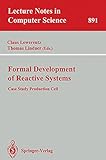Formal Development of Reactive Systems [electronic resource] : Case Study Production Cell / edited by Claus Lewerentz, Thomas Lindner.
Material type: TextSeries: Lecture Notes in Computer Science ; 891Publisher: Berlin, Heidelberg : Springer Berlin Heidelberg, 1995Description: XII, 400 p. online resourceContent type: text Media type: computer Carrier type: online resourceISBN: 9783540491330Subject(s): Computer science | Software engineering | Computer aided design | Computer Science | Software Engineering | Special Purpose and Application-Based Systems | Programming Techniques | Programming Languages, Compilers, Interpreters | Computer-Aided Engineering (CAD, CAE) and Design | Control EngineeringAdditional physical formats: Printed edition:: No titleDDC classification: 005.1 LOC classification: QA76.758Online resources: Click here to access online
TextSeries: Lecture Notes in Computer Science ; 891Publisher: Berlin, Heidelberg : Springer Berlin Heidelberg, 1995Description: XII, 400 p. online resourceContent type: text Media type: computer Carrier type: online resourceISBN: 9783540491330Subject(s): Computer science | Software engineering | Computer aided design | Computer Science | Software Engineering | Special Purpose and Application-Based Systems | Programming Techniques | Programming Languages, Compilers, Interpreters | Computer-Aided Engineering (CAD, CAE) and Design | Control EngineeringAdditional physical formats: Printed edition:: No titleDDC classification: 005.1 LOC classification: QA76.758Online resources: Click here to access online  E-BOOKS
E-BOOKS
| Current library | Home library | Call number | Materials specified | URL | Status | Date due | Barcode |
|---|---|---|---|---|---|---|---|
| IMSc Library | IMSc Library | Link to resource | Available | EBK6672 |
Task description -- Comparative survey -- CSL -- Esterel -- Lustre -- Signal -- Statecharts -- TLT -- SDL -- Focus -- Spectrum -- KIV -- Tatzelwurm -- HTTDs and HOL -- Raise -- Deductive synthesis -- Symbolic Timing Diagrams -- LCM and MCM -- Modula-3 -- TROLL light -- Simulation.
This book is based upon work done under the project "Correct Software through Formal Methods" supported by the German Ministry of Research and Technology. As a case-study report on the practice of formal software development, this book systematically presents and compares 18 different approaches to the control of a real-world production cell. Mathematically precise, formal methods play an increasingly important role in software development, particularly in areas where failure of software would result in injury to people or, at best, significant loss of money. By analyzing the benefits and explaining the use and limitations of formal methods on a sample basis, this book provides a roadmap for the selection and application of appropriate approaches and thus helps in putting formal methods into industrial use.


There are no comments on this title.